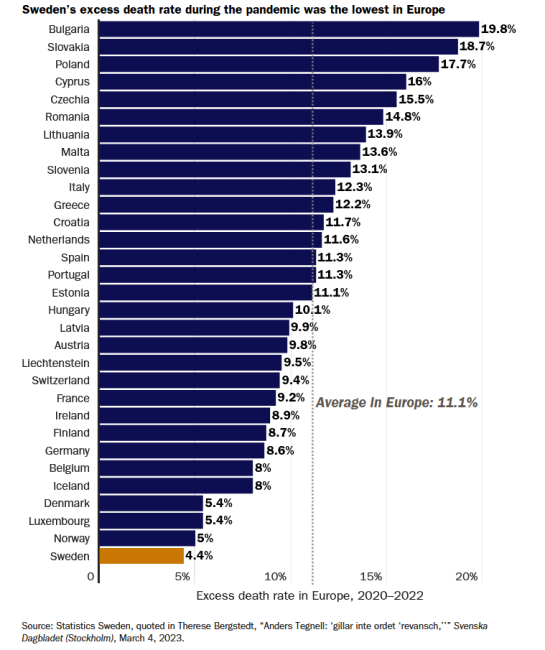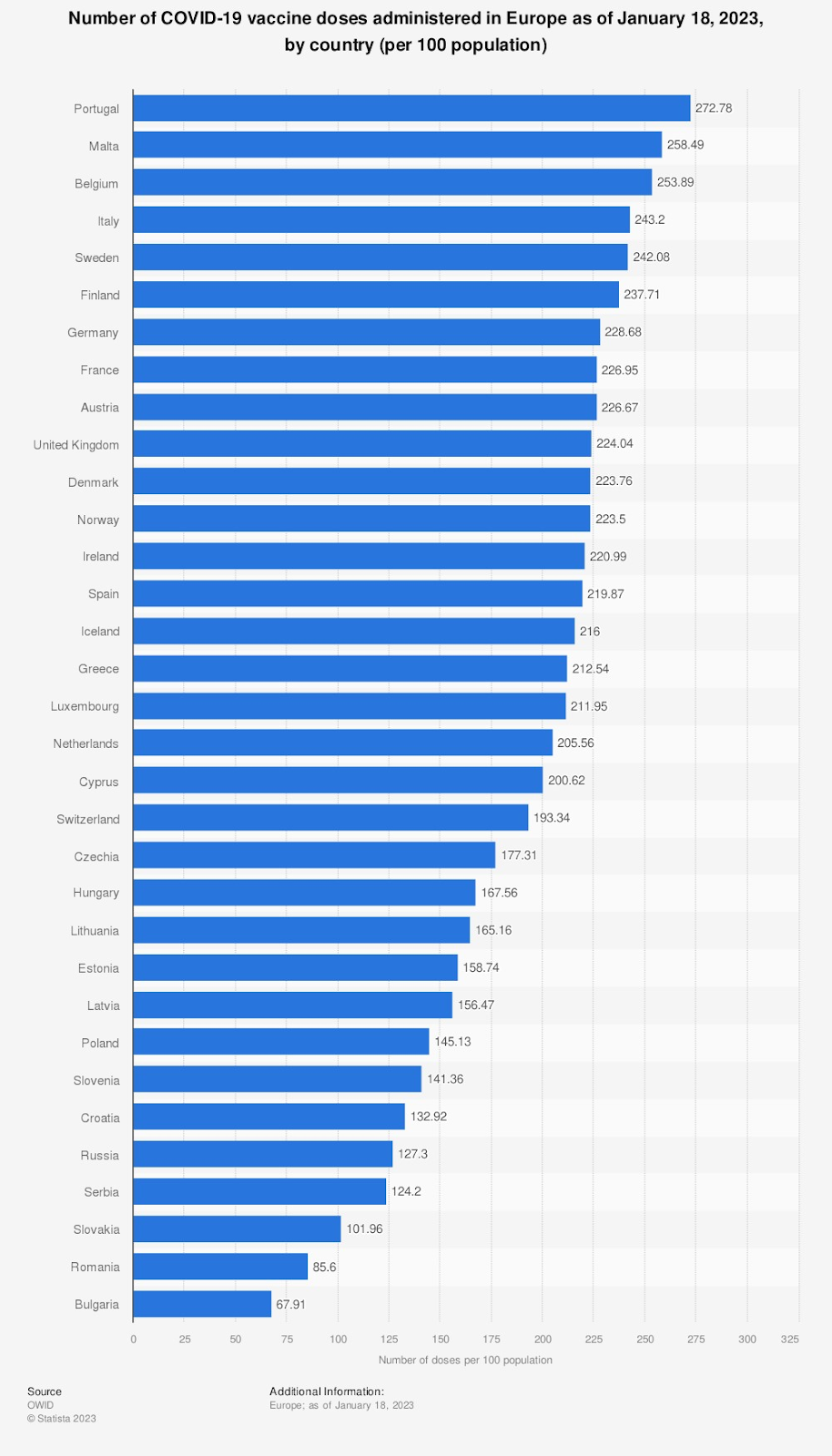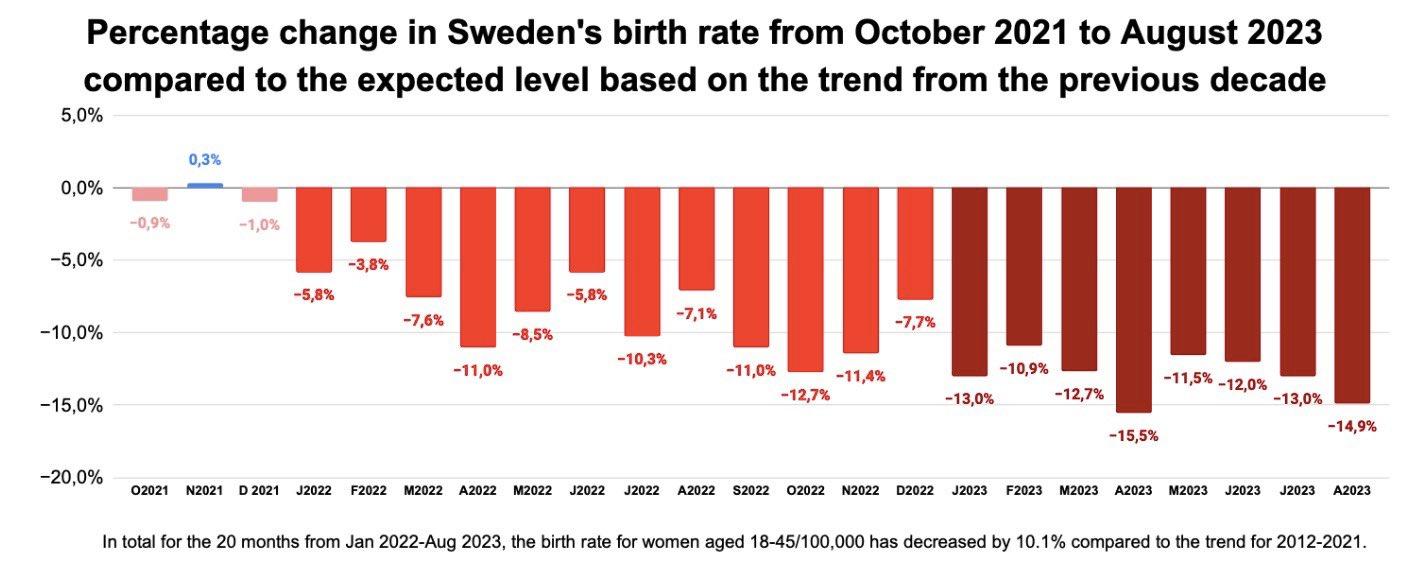
It is chapter and verse nowadays among Covid-19 policy dissidents – or at least those who get amplified the most on X – that “Sweden won:” namely, by bucking the trend and refusing to lock down, taking the initial hit of higher excess mortality at the outset of the Covid-19 pandemic, but ultimately being rewarded by lower excess mortality over the official course of the pandemic as a whole.
Graphs like the one below, showing Sweden with the lowest excess mortality in all of Europe during the pandemic period, are widely cited as ostensible evidence of this victory of Sweden’s “no lockdown” approach.

But the opposition to the Covid measures has been spectacularly wrong-footed in citing such data, since if Sweden did indeed resist lockdown, it by no means resisted mass vaccination. As the below Statista graph illustrates, Sweden in fact had one of the highest Covid-19 vaccination rates in Europe.

If the vaccination ranking is not quite a mirror image of the mortality ranking, it is, nonetheless, striking that while high-vax Sweden has the lowest excess mortality in the mortality graph, Bulgaria, which has the lowest vaccination rate, has the highest excess mortality.
Indeed, the entire top of the mortality table, i.e. the countries with the highest mortality, consists of relatively low-vax Eastern European countries. Hence, if the data in the first graph is to be believed, it would appear to demonstrate less that “Sweden won” – since virtually all the other countries locked down anyway – and more that Covid-19 vaccination “won.”
It is perhaps worth noting here that the first graph comes precisely from Statistics Sweden – not exactly a neutral source in this connection – and was commissioned by the Swedish daily Svenska Dagbladet for the purpose of an interview with Anders Tegnell, the architect of Sweden’s Covid-19 response.
But, in any event, a group of dissident Swedish doctors known as the The Doctors’ Appeal/Läkaruppropet has been challenging the new orthodoxy on Sweden’s alleged Covid-response “win,” calling attention to other data which looks like anything but “winning.” For if Swedish mortality has remained relatively stable, Swedish natality has in fact plummeted.
As can be seen in the below graph from the Läkaruppropet group, Swedish birth rates have been below the prior 10-year trend for no less than 20 months now and the Swedish birth shortfall has gotten progressively worse, reaching a low of -15.5 percent in April of this year and standing at nearly -15 percent according to the latest figures. The Läkaruppropet doctors point out, moreover, that the decline in Swedish birth rates began after Covid-19 vaccinations were rolled out to women of childbearing age.

But there is an obvious paradox here: If toxicities of Covid-19 vaccines had such a major impact on natality, why did they not also have a major impact on mortality?
Well, the Läkaruppropet doctors suggest that they may well have. They note (here) that Sweden’s 2022 excess death was the second highest in the last 20 years and suggest that it would in fact have been the highest were it not for the iatrogenic harms caused by the treatments received by vulnerable Swedes who contracted Covid-19 in 2020.
The famous “Sweden won” graph reproduced above uses a 3-year (2017-2019) pre-pandemic average as baseline for calculating excess mortality. (For the details of the methodology, see Bjorn Lomborg’s post here.) Using that same baseline and the official Swedish statistics here, we can calculate that Sweden had just over 4 percent excess mortality in 2022, up from just over 1 percent in 2021.
Perhaps this is a relative victory compared to some other countries. But for the third year of the pandemic – by which time Sweden should surely have been enjoying the benefits of the herd immunity to Covid-19 that none other than Anders Tegnell had touted once-upon-a-time – it is hard to see how this can be regarded as a victory in absolute terms.
Disclaimer
Some of the posts we share are controversial and we do not necessarily agree with them in the whole extend. Sometimes we agree with the content or part of it but we do not agree with the narration or language. Nevertheless we find them somehow interesting, valuable and/or informative or we share them, because we strongly believe in freedom of speech, free press and journalism. We strongly encourage you to have a critical approach to all the content, do your own research and analysis to build your own opinion.
We would be glad to have your feedback.
Source: Brownstone Institute Read the original article here: https://brownstone.org/

